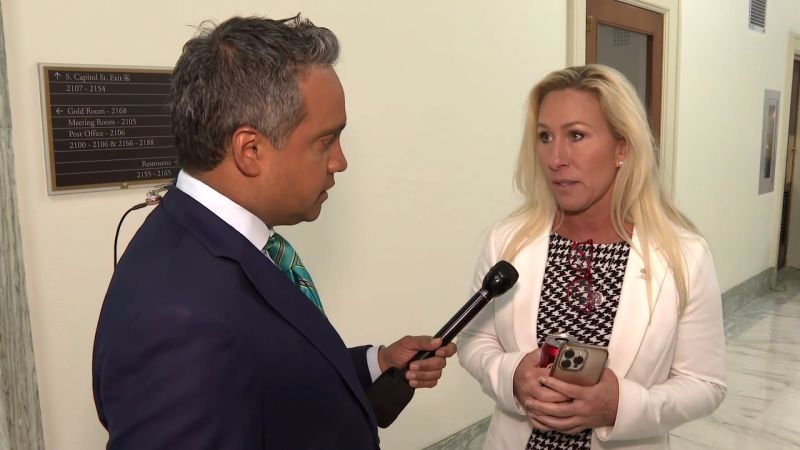House Speaker Mike Johnson is standing firm in his decision to move forward with a series of foreign aid bills, which includes funding for Ukraine, despite facing pressure from hardliners within his party. This decision comes after significant debate and pushback, particularly from prominent figures such as Rep. Marjorie Taylor Greene. Greene, a Republican from Georgia, has been vocal in her opposition to the foreign aid bills and has even gone as far as to motion for Johnson to be ousted as speaker. However, Johnson remains resolute in his commitment to ensure that the aid packages are brought to the floor for consideration and approval.
In a recent interview with CNN’s Manu Raju, Rep. Marjorie Taylor Greene expressed her frustrations with Speaker Johnson and his stance on the foreign aid bills. Greene believes that the funding for Ukraine and other countries should not be prioritized, particularly at a time when there are pressing issues facing Americans at home. She argues that the money allocated for foreign aid would be better spent on matters such as border security, healthcare, and infrastructure within the United States. Greene’s motion to remove Johnson as speaker reflects her dissatisfaction with his leadership and the direction in which he is taking the House with regards to foreign aid.
Johnson’s decision to proceed with the foreign aid bills reflects a broader debate within the Republican Party about America’s role in providing aid to other countries. While some members, like Greene, advocate for a more America-first approach that prioritizes domestic issues, others argue that foreign aid is essential for maintaining diplomatic relationships and promoting stability globally. Johnson’s handling of this issue has put him in the spotlight and has led to tensions within his party. However, he remains committed to following through with the aid packages and ensuring that the necessary funding is provided to countries like Ukraine.
The conversation between Manu Raju and Rep. Marjorie Taylor Greene sheds light on the complexities of the debate surrounding foreign aid and the differing perspectives within the Republican Party. Greene’s motion to oust Johnson highlights the internal divisions and disagreements within the party on this issue. It also underscores the challenges faced by party leaders like Johnson in balancing the interests of different factions within the party while also addressing broader policy goals. The clash over foreign aid reveals deeper ideological differences that are prevalent in the GOP and will likely continue to shape future policy decisions.
As the debate over foreign aid continues to unfold in the House, Speaker Mike Johnson’s leadership will be put to the test. His decision to move forward with the aid bills, despite facing backlash from hardliners like Marjorie Taylor Greene, demonstrates his commitment to fulfilling his responsibilities as speaker and ensuring that legislation is brought to the floor for debate and consideration. The outcome of this debate will not only impact the future of foreign aid policy but also have broader implications for the direction of the Republican Party and its approach to international affairs. It remains to be seen how Johnson and other party leaders will navigate these challenges and address the concerns raised by members like Greene as they work towards finding common ground and advancing their policy agenda.


